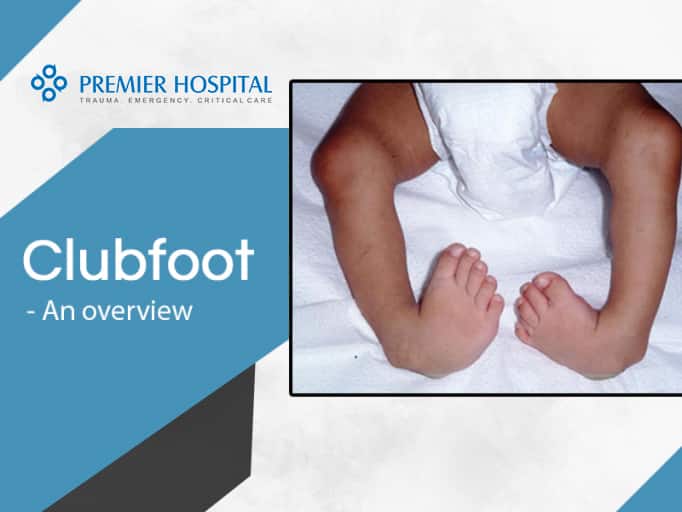Clubfoot – Causes and Symptoms
by Premier Hospitals | November 22, 2018 |
When you have a child, you document every single thing they do. Their firsts matter to you so much. From their first cry to the first time they fart, it’s nothing but moments of sheer pleasure and pride - the little thing you created can now do things on its own.
As our baby starts growing up, you start growing up, too, eager from them to achieve all their milestones. You are always camera-equipped, ready to capture their little moments of glory. You look forward to their first smile, their first words, and of course, their first steps.
But, what if there is something preventing your baby from accomplishing these milestones? What if your baby is unable to walk? What could probably cause it? Complications in their foot. Â One of the most common complications which often arise in babies is when the feet of the baby is either deformed or unusually positioned once the baby is born. Â This condition is called Clubfoot.
Â
 Â
Â
The characteristics of clubfoot are varied which is dependant on various factors and can vary from mild to severe:
- The foot of the baby, especially the heel is smaller than normal.
- The foot may point forward
- The edge or front part of the foot may be pointing to the other foot.
- The foot might be turned in and in some extreme cases, the bottom of the foot may point up.
Causes of Clubfoot :
Most diseases and conditions are often a result of genetic or environmental factors. When we talk about clubfoot causes, it’s the same. Even though in many cases, the causes of clubfoot is usually persistent with the position of the baby while he or she is in the womb of the mother which is called Postural Clubfoot. When it comes to the genetic markers of this condition, it is almost like any other condition. If anyone in the family has clubfoot, it becomes highly likely that the child will also have it. Also, if one child in the family has clubfoot, the chances of the second child having the condition increases to a great extent. Genetics is the major causes of clubfoot. Now, with regard to the environmental factors and causes of this condition, it is often seen that if the mother has problems which affect the nerve, muscle or even the bone systems, it may result in this condition, hence it is very important to get a newborn screening done for the baby so that the chances of having most the conditions including clubfoot can be minimised.
Clubfoot Symptoms :
The symptoms of most physical disabilities are diagnosed at birth. Clubfoot symptoms are the same also fall under this category. Although not painful while at rest, clubfoot symptoms can eventually cause discomforts and may become a perceived disability as the child grows. It is very necessary for the treatment to begin at birth itself because if left untreated, the complications may worsen as clubfoot does not cure naturally. This is why it’s essential to pay attention to any clubfoot symptom that might exist in the baby. With time, when the child gets older, he or she may have problems with wearing footwear or daily activities such as walking or running as one foot may be shorter than the other. Clubfoot symptoms eventually worsen with time. If the treatment for clubfoot begins post-birth on an immediate basis, immediately upon observing clubfoot symptoms, these problems can be avoided to a great extent. All in all, it needs to be understood that ignoring clubfoot symptoms and leaving it untreated, expecting it is going to heal naturally is wrong. Treatment for clubfoot should be started once the diagnosis is done for the condition once the baby is born because clubfoot symptoms don’t generally go away. The doctor and the hospital should have the expertise and equipment to make sure that the baby can get his legs back with time.About The Doctor:






